
CHART
BOX
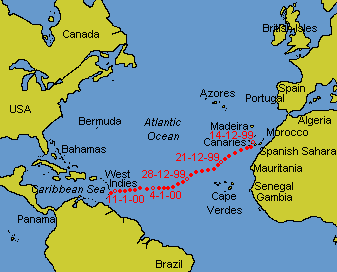
© Copyright 1999-2000 Nigel Jones/MistWeb Software

We had bought a two-wheel collapsible trolley in Santa Cruz. We made good use of this during half a dozen trips back and forth to the local supermarket - 'Hyperdino'. We stocked up with
We also stocked up on the usual tins of beans, chilli, hot-dog sausages, soups, peas, sweetcorn etc. We found, for the first and so far only time, stocks of tinned butter in Hyperdino. This was marvellous and the ten tins we have bought should easily see us home next summer. For the chocaholic on board we had a large jar of Nutella and three multipacks of Smarties.
 | CHART |
 | |
| Sketch Maps and Chartlets (not to be used for navigation!) © Copyright 1999-2000 Nigel Jones/MistWeb Software | |
We loaded poor old Rusalka well down to her new waterline, which is already two inches (50 mm) higher than when she left the manufacturer's slip. She has tankage for 50 gallons (227 litres) of tap-water and 28 gallons (127 litres) of diesel. These were both topped right off and, in addition, we had 6 gallons of tap-water and 5 gallons of diesel in jerry cans in cockpit lockers.
As it may be difficult to obtain in the Americas we had four spare bottles of Camping Gaz butane lashed on deck as well as two full ones in the gas locker. We tend to use about a bottle a month so this represents six months' supply of cooking gas.
As it turned out we had nearly that duration's supply of diesel, if not water, too! Our water tanks are flexible bags under the cabin sole. They move about in a seaway and with all the metal-work I have done using a vice clamped to the companionway steps over the years, I am very aware that one could chafe through at any time. They are all still interconnected so this worry partly explains our belt, braces, suspenders, two bits of string and a prayer approach to water carrying!
We had a rough and boisterous Atlantic crossing and for the first few days neither of us felt much like eating. This was the residual effect of sea-sickness at work. The body tends to shut down in protest at first these days when rocked and shaken by putting to sea. Nothing too serious, but it is important to make an effort to eat and especially to drink at this stage so that it does not become debilitating or permanent in effect.
This was followed by a real effort to eat three times a day at mealtimes. We did eventually give up on this and settled for one hot, or at least substantial, meal a day at about noon, supplemented by fruit, snacks and yes, I admit it, by sweets for the rest of each 24 hours.
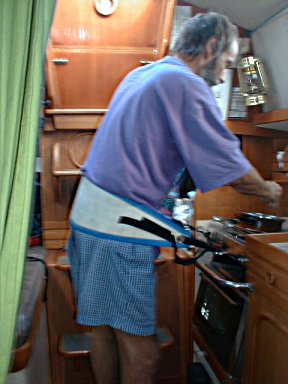 |
| This bum-strap for the galley was fairly useful, although it could engender a feeling of false security. here Nigel works away at one of our one-pot delights. |
Typical mid-day meals were out of tins and accompanied by one or two pan de leche sweet bread rolls. They were:
To begin with we had fresh tomatoes and onions to go with these delights. After a while we were happy for the extra pep lent to each one by tomato ketchup, sweet chilli sauce, HP brown sauce or just some oil and vinegar sloshed on top. Our fruit lasted about half way across, including bananas, oranges and apples. Once or twice we boiled pasta or porridge which made a nice change.
It is not that we are inherently that lazy normally, but with the boat rolling and occasionally lurching the way it did, this really was about as much effort as we could muster. We soon learned the rule - 'One hand for yourself, one hand for the boat' - as it applies in the galley. Never pick up two objects at a time, one in each hand. If you do, and then a wave rolls us over to 45° or more, you will either have to drop at least one of them, or accept that you may be thrown helplessly across the boat with painful and perhaps dangerous consequences. Even with both of us working closely together, this rule made for slow and frustrating progress on even the simplest job. Every time one is tempted to push one's luck, a spilled bowl of cereal and milk or another painful crack on the hip as you fall from the chart table surround to the edge of the sink acts as a saddening reminder.
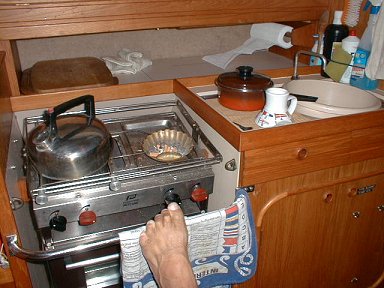 |
|
Here you see our galley during one of Nigel's night watches. This is fairly typically how it looked most of the time: reasonably tidy because nothing stayed put for long unless put away, the ashtray taking advantage of the cooker's gimbals and one of those brilliant ship's mugs in use - with strong, milky coffee inside! The photographer's foot braced onto the cooker's crash-bar was absolutely necessary as the camera occupied both hands! |
To minimise washing up, we warmed each day's culinary treat in one saucepan only ("It'll all mix up in your stomach anyway!"), dished half into a bowl for Nicky and then I ate the other half straight out of the pan, often scraping it very clean indeed with my spoon!
The two best new items we had on board were the pair of deeply flared ship's mugs that Nicky's Dad had brought us over from Jersey when they visited us in Santa Cruz. With their extra-wide foam-rubber bases, their low centres of gravity and a few pieces of Scoot-Guard non-slip mat put around the place, they enabled us to make and enjoy tea, coffee and even hot cocoa in a way previously impossible in the open ocean. Twice, particularly impressive lurches sent them flying out of the actual sink bowl - which has previously always been a safe haven for unwashed crocks. They landed three feet (a metre) down on the varnished wood floor and did not even chip! The pottery they're made from is about a quarter of an inch (6 mm) thick and they must be virtually unbreakable. (Don't speak too soon!)
Nicky drank bottled water but I made an effort with the Tenerifian tap-water most of the way across. It tastes metallic and is heavily chlorinated but I wanted to conserve the best resources for as long as possible.
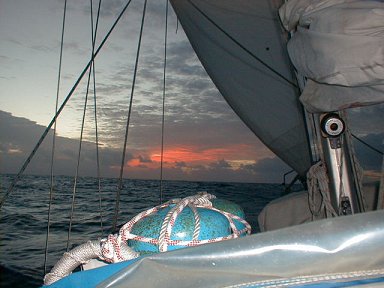 |
| Another hot day comes to an end with a glorious sunset ahead of us. Notice the Camping Gaz butane bottles lashed on deck. We took six, rather than mess around converting to propane while in the Caribbean. |
The long-life UHT milk coming in litre packs was an issue in itself. We did not have enough power to run the fridge at all. It soon became a serious health hazard in there as spilt milk and butter from which the lid had fallen off, coated the beer cans in a festering slimy layer. We took to refilling water bottles with freshly opened milk (a two-person or very hit-and-miss affair in itself!). The clear plastic bottles with their screw-tops had several advantages. The milk was contained as we rolled, it was visible to gauge the extent of any separation and decomposition before it got into a hard-earned cup of coffee and any hint of pressurisation was a good warning that fermentation had begun inside. We did not try to wash out bottles after use, the festering contents went down the sink and the bottles were crushed underfoot before consigning them to the bin. (Gasses produced by putrefying milk regularly set the gas-alarm off at that stage!)
In order to minimise the waste we made a real effort to drink milk every way we could while it was freshly opened. Hence the cereal, the hot cocoa and the regular cups of instant coffee made with pure milk, no water. I found that the effort and fuss of making, and then drinking a hot cup of coffee, followed by enjoying its very noticeable stimulant effect, was a good way of passing nearly a hour of a four-hour night watch.
We each may have lost a few pounds but we were never dehydrated during the crossing. We have soon put the weight back on and have enjoyed the variety of tastes and textures in food back ashore perhaps like never before!
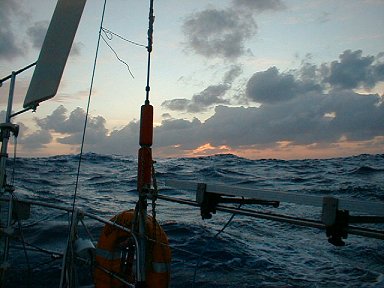 |
| Following each sunset ahead, there eventually came the very welcome sunrise behind us. Days and nights in the tropics are always very close to equal length - six to six o'clock. |
We have been amazed to hear from two quite different couples here in the anchorage in Carlisle Bay, Barbados, that they made no effort to keep watch at night during their Atlantic crossings. They are both older couples than us, and have both been sailing for many more years than we have. They habitually just go to bed together at the end of each day and get up in the morning to see where the wind has got them to.
We kept up a strict four-hour watch system the whole way across and it was, without doubt the most arduous aspect of the crossing. We updated our clock setting by an hour every 15° of longitude as we travelled, and added half an hour to each of our watches either side of noon on those days. There are either two watches in the night (2000 - 0000 and 0400 - 0800) or just one (0000 - 0400). To begin with I manfully took on the schedule that had the two, but after a week I was so exhausted that I asked Nicky if we could introduce dog-watches to alternate the schedules. My tiredness was being exacerbated by radio schedules which kept me busy for much of the 0800 - 1200 watch anyway (see below for more about this).
Nicky was quite rightly concerned that having a different sleep pattern every night would be a problem but I was convinced that this ancient and traditional system would be workable. We tried it and found that the body seems quite able to deal with it, although we were very glad to get a full night's sleep once the anchor was down. I found that the first night in port I slept like a dead man. I was awoken by a sharp pain in my knee which - ten hours after closing my eyes - had been brought on by my simply trying to move my leg for the first time that night. Every joint had seized up entirely due to the lack of natural movement in my sleep! The second night's sleep was when my dreaming re-commenced. I had a entire night of exhausting and demanding, full technicolor dreams. It appeared that four-hour streches were not enough for the mind to do whatever it is, that it has to do, that involves dreaming. I soon caught up. At sea, our watch system looked like this:
| Morning watch |
Afternoon watch |
Dog watches |
Early night watch |
Mid-night watch |
Dawn watch |
Morning watch |
Afternoon watch |
Dog watches |
Early night watch |
Mid-night watch |
Dawn watch |
||
|---|---|---|---|---|---|---|---|---|---|---|---|---|---|
| 0800-1200 Nicky | 1200-1600 Nigel | 1600-1800 Nicky | 1800-2000 Nigel | 2000-0000 Nicky | 0000-0400 Nigel | 0400-0800 Nicky | 0800-1200 Nigel | 1200-1600 Nicky | 1600-1800 Nigel | 1800-2000 Nicky | 2000-0000 Nigel | 0000-0400 Nicky | 0400-0800 Nigel |
For most of our crossing this served us well. All in all we saw about half a dozen ships during the 29 days. We asked two of these to change course to give us a safer clearance. We also saw two German yachts, overtaking us one night. They were sailing in company with each other and were exagerating their speeds, we think, to impress the other. They gave us speeds of 6.5 and 7.3 knots and asked us if we needed any assistance since I truthfully reported our speed at 3.4 knots. They eventually arrived in Carlisle Bay only about a day before us. We logged their names as 'Unit' and 'Enoch', but when we got here we recognised them as 'Judith' and 'Inouk', a couple of 40-ft plus live-aboards anchored within hailing distance of each other for a few days before they moved on again.